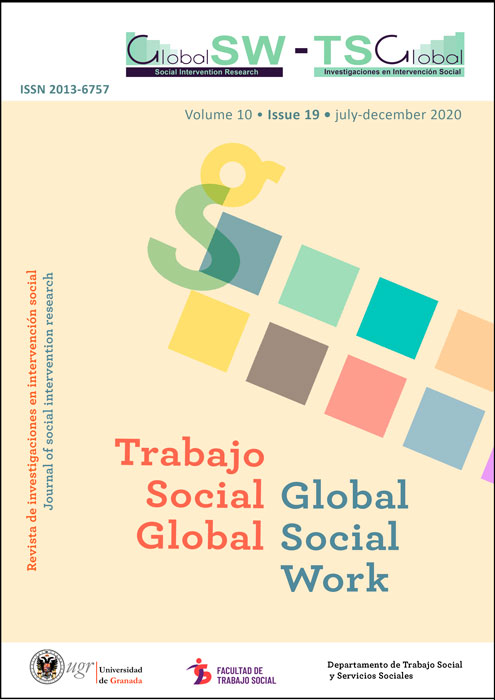Quality management in patients associations. Diagnosis in the Spanish Federation of Cystic Fibrosis
DOI:
https://doi.org/10.30827/tsg-gsw.v10i19.14097Keywords:
Patients associations, Cystic Fibrosis, quality management, quality, Social WorkAbstract
The mission of the Spanish Federation for Cystic Fibrosis is to coordinate the Cystic Fibrosis Associations towards improving the quality of life of people with Cystic Fibrosis and their families. The development has not been homogeneous among all member associations. This article exposes the diagnosis of the issue. Using a quantitative and qualitative methodology, documentary analysis, semi-structured interviews and surveys have been triangulated. The results obtained raise quality management as an element that favors associative strengthening and the figure of the social work professional as a driver of change in the third sector. In this way, all associations will have the means to improve the efficiency of their offered services, the satisfaction of their target groups, and the image they project to society.
Downloads
References
Aliena, R. y Pérez, J. (2006). Más allá del paradigma de los recursos. Los servicios sociales, el Trabajo Social y sus retos. Acciones e Investigaciones Sociales, (Extra 1), 461-477. URI: http://hdl.handle.net/10550/67401
Barranco, C. (2004). Los servicios sociales y la calidad integrada, investigación realizada en centros de atención a las personas con discapacidad. Siglo Cero, 35 (211), 5-17.
------------- (2011). Buenas prácticas de calidad y trabajo social. Alternativas. Cuadernos de Trabajo Social, (18), 57-74. doi: http://dx.doi.org/10.14198/ALTERN2011.18.03
Barriga, L. (2000). Calidad en los Servicios Sociales: reflexiones sobre la Calidez. Servicios Sociales y Política Social, (49), 31-62.
Botija, M., Uceda, X. y Navarro, J. (2015). La trabajadora social en los centros de internamiento de medidas judiciales. Servicios Sociales y Política Social, (109), 107-119. Recuperado de: https://www.serviciossocialesypoliticasocial.com/la-trabajadora-social-en-los-centros-de-internamiento-de-medidas-judiciales
Club de Excelencia en la Gestión (2013). Modelo EFQM 2013. Recuperado el 9 de marzo de 2020 de: https://desarrollo.clubexcelencia.org/modelo-efqm-2013
Club de Excelencia en Gestión. (2020). Modelo EFQM. Recuperado el 9 de marzo de 2020 de: https://www.clubexcelencia.org/modelo-efqm
Fantova, F. (diciembre, 2006). La gestión de calidad y el papel del tercer sector en la política social. Ponencia presentada en el Congreso sobre Calidad, Tercer Sector y Política Social, Madrid, España
Federación Española de Enfermedades Raras. (2009). Estudio sobre la situación de necesidades sociosanitarias de las personas con Enfermedades Raras en España. Estudio ENSERio. Recuperado el 9 de marzo de 2020 de: https://enfermedades-raras.org/images/stories/documentos/Estudio_ENSERio.pdf
Federación Española de Fibrosis Quística. (2018). Plan estratégico 2018-2021. Valencia: FEFQ. Recuperado el 9 de marzo de 2020 de: https://fibrosisquistica.org/wp-content/uploads/2018/10/Plan-Estratgico-2018-2021.pdf
Flores, P. (2013). El enfoque de la política basado en la evidencia: Análisis de su utilidad para la educación de México. Revista Mexicana de Investigación Educativa, 18(56), 265-290. Recuperado de:
https://www.comie.org.mx/revista/v2018/rmie/index.php/nrmie/article/view/244/244
Garau, J. (2005). Guía para la gestión de calidad de los procesos de Servicios Sociales. Recuperado el 9 de marzo de 2020 de:
González-Menorca, L, Fernández, R, Juaneda, E. y , Fernández, J (2011). Sistemas de calidad en programas sociales. En Esther Raya Diez (Coord.). Herramientas para el diseño de proyectos sociales (pp.81-90). Logroño: Universidad de La Rioja, Col. Material Didáctico, Trabajo Social, nº 1.
Guillén, E. y Pérez, D. (2002). Procesos de mejora: calidad, decisiones e innovación. En T. Fernández y A. Ares (Coords.). Servicios Sociales: dirección, gestión y planificación (pp. 213-236). Madrid: Alianza
Navarro, J. y Pastor, E. (2018). De los riesgos de la socialización global: adolescentes en conflicto con la ley con perfil de ajuste social. Convergencia, 25(76), 119-145. doi: https://doi.org/10.29101/crcs.v25i76.4442
Nobili, R., Duff, A., Ullrich, G., Smrekar, U., Havermans, T., Bryon, M., et al. (2011). Guiding principles on how to manage relevant psychological aspects within a CF team: Interdisciplinary approaches. Journal of Cystic Fibrosis, 10(Suppl.2), S45-S52.
doi: https://doi.org/10.1016/S1569-1993(11)60008-8
Ochando-Ramírez, M.V. (2016). Calidad en Servicios Sociales Especializados (Tesis doctoral). URI: http://hdl.handle.net/10953/768
Plataforma de ONG de Acción Social. (2020). El Tercer Sector en España. Nuevos horizontes para un nuevo contexto sociopolítico. Recuperado el 9 de marzo de 2020 de: https://www.plataformaong.org/ARCHIVO/documentos/biblioteca/1583424466_informe-poas-completo.pdf
Rodríguez-Calleja, N. (2013) Reconocimiento a la gestión y al compromiso social. Esquema de estándares de gestión para las organizaciones sociales. Madrid: Fund. Grupo Develop
Sociedad Española contra la Fibrosis Quística. (2018). Spanish Cystic Fibrosis Registry: Annual Report 2016. Recuperado el 9 de marzo de 2020 de: https://fibrosisquistica.org/wp-content/uploads/2018/09/Report2016SpainFinal.pdf
Turpin, A., & Shier, M. (2019). Social entrepreneurial orientation in human service organizations: A scoping review. Human Service Organizations (2), 144-168. doi: https://doi.org/10.1080/23303131.2019.1700580
Downloads
Published
How to Cite
Issue
Section
License
Authors publishing in this journal agree to the following terms:
- Authors retain their copyright. They guarantee to this journal the right to a first publication of the work submitted to initiate the editorial process.
- Authors know that their work is published under a Creative Commons License which allows others to share it, with a recognition of the work's authorship and its initial publication in this journal.
- Authors share with Global Social Work explotation rights of the work that has been published in this journal, authorizing the execution of a free reproduction, distribution and public communication. Authors know that their work will be stored on servers and reproduced in digital format for inclusion in institutional repositories and databases that will facilitates free access to the full text of the work.
- Authors may distribute the version of the work published in this journal (for example, to an institutional repository or publish it in a book), with the explicit acknowledgment of its initial publication in this journal.
Copyright on the texts published in Trabajo Social Global -Global Social Work, as well as editorial policy of the journal refering to self-file and deposit in institutional or thematic repositories, are identified in the database





















